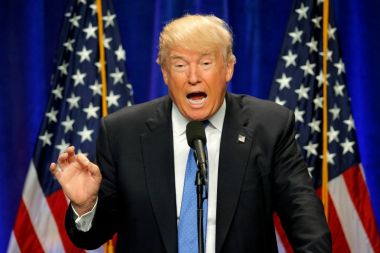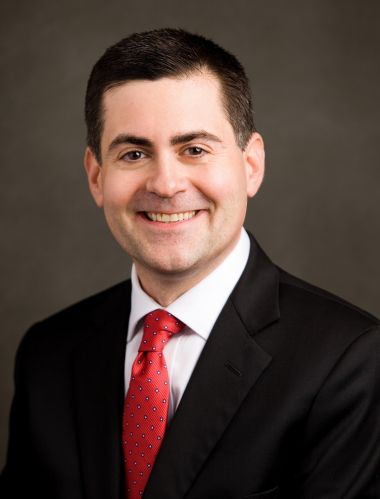The one reason Christians should fear a Trump presidency

As the race for the White House enters its final months, the polls are tightening and we're faced with the possibility that Donald J Trump could be the 45th president of the United States.
Thousands of articles have discussed the various reasons why this is an extraordinary thing. Both Christian and secular publications have asked one of the most fascinating questions of the campaign: why are Christians, and evangelicals in particular, supporting Trump? Of course, many of them aren't but polls suggest 78 per cent of white evangelicals will back Trump in November.
Not only do the poll numbers show a massive proportion favour him, but Trump also has significant backing from a number of high-profile evangelical figures. Jerry Falwell Jnr, the President of Liberty University, says he supports Trump because of, "his love for ordinary Americans and his kindness, generosity and bold leadership qualities". This 'kindness and generosity' seems also to have been noted by leading Reformed theologian Wayne Grudem, megachurch pastor Jentezen Franklin, televangelists Paula White and Kenneth Copeland, veteran conservative campaigner Dr James Dobson and many more.
We could ask a number of questions of those evangelical Trumpistas. How can they support a candidate who can't name a Bible verse? How can they support a candidate who says he's never asked for forgiveness? How can they support a candidate who owns casinos? We could go on and on...
But there is one question that, for me, should be put to every single Trump supporting evangelical from the first-time voter to the high-profile media endorser.
It's this: how can you support a candidate who doesn't believe in religious liberty?
Because you can be certain of one thing. Donald Trump doesn't believe in religious liberty. He flatters Christian leaders by telling them what they want to hear. "We talk about religious liberty, and I think it is the number one question," said Trump in a meeting with evangelical leaders. "There are numerous things that we're going to be doing," he carried on, suggesting he would name conservative judges to the Supreme Court, allow people to say "happy Christmas" and allow school sports coaches to pray with their teams.
While those leaders lapped up Trump's typically vague and incoherent answer, they missed the deeply troubling threat to religious liberty that was right before their eyes. Maybe they missed it because it wasn't aimed at Christians. It was aimed at Muslims. But while Trump may be scratching the backs of celebrity pastors and preachers and telling them what they want to hear about saying "happy Christmas" his campaign has contained a disastrous threat to religious liberty.
It was first announced on December 7 last year. In his classic self-aggrandising way, Trump announced the policy in the third person: "Donald J Trump is calling for a total and complete shutdown of Muslims entering the United States until our country's representatives can figure out what is going on."
This is an almost unprecedented move. Since its foundation, the United States has been built on immigration. Of course, that history has been chequered. The arrival of Catholics caused consternation among white Anglo-Saxon Protestants. Jews have faced familiar discrimination as in other parts of the world. Other religious minorities such as Mormons have found religious freedom to be a less than perfect concept. Yet, for the most part, the United States – despite its many difficulties – has maintained religious freedom.
Since the First Amendment to the Constitution itself declares that, "Congress shall make no law respecting an establishment of religion, or prohibiting the free exercise thereof" it is very difficult to see how Trump's plan is anything other than a desperate ploy to exploit legitimate fears about Islamist terrorism and turn them to his electoral advantage.
Muslims must receive the same treatment as all other incomers to the USA otherwise the whole framework of religious liberty is under threat. If a President can simply decide that members of one faith are less desirable, then freedom of religion is a thing of the past.
While that wouldn't impact Christians under a Trump regime, the precedent would be set. Presidents would now be allowed to ban members of certain faith from entering the country. If Muslim immigrants are being made to answer for the actions of extremists in the Middle East, then what is to stop Christian immigrants being made to answer for the actions of their co-religionists?
The government mustn't go down this road. It isn't just a slippery slope. It's an icy cliff. And Trump is poised at the top ready to push religious liberty off to suit his own purposes.

"But Hillary will be just as bad" will come the complaint. Well, there are undoubtedly problems with Clinton's campaign, but she isn't promising to discriminate against a whole faith group simply because of their religious affiliation.
Some Christian leaders have seen through Trump's ruse and have spoken out against him. Dr Russell Moore from the Southern Baptist Convention has repeatedly attacked support for Trump. This week he said, "Evangelicals, who have previously said character matters, who this year are saying character doesn't matter that much, are never going to be able to address the issue of character again. Never." He went on, "For me the primary issue is not who's up and who's down in the horse race in 2016."
Religious freedom isn't for sale. Trump mustn't be allowed to get rid of a concept which has served America since its foundation.
In a recent article in the Washington Post, Falwell claimed, "A vote for Donald Trump and Mike Pence is a vote for more freedom." For Muslims, this is the opposite of the truth. That should terrify everyone, because without religious freedom for all, the concept is meaningless – and before long all Americans will be looking over their shoulders.
Follow Andy Walton on Twitter @waltonandy











